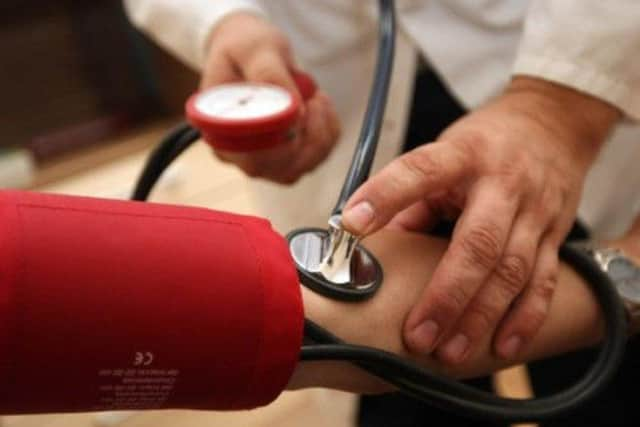NHS Scotland crisis: Deprived areas will see fewer GPs as health gap widens, warns BMA
Dr Andrew Buist, chair of the British Medical Association's (BMA) Scotland’s GP committee, said more affluent areas would be able to afford to continue with the traditional model of GPs, “further widening inequalities”.
“If we carry on without policy change, then the health inequalities in Scotland will further widen as those with the means to do so will increasingly go private for parts of their care,” he said.
Advertisement
Hide AdAdvertisement
Hide Ad“For general practice without change I anticipate the rise of large, doctor-light salaried practices in urban deprived areas, while more affluent areas continue with the traditional model further widening inequalities."


Dr Buist also called for “a national conversation with the public on the future of our health and social care system”, adding “the reality is not everything will be affordable” through taxation.
“Some might say it is an easy thing to call for, harder to deliver on,” he said.
“Undoubtedly it is an uncomfortable conversation for politicians, particularly those in power to oversee with the inherent need for us all to face facts and be realistic about what we need and balance that with what we can afford, or perhaps more accurately what we are willing to pay for through general taxation.
“The reality is not everything will be affordable, so what do we prioritise? We are clear that care needs to stay free at the point of need, but given how many people are now going private to avoid long waits, how do we protect that founding principle, while delivering what we need from our modern day the NHS?”
Dr Buist said part of the problem has been a historic focus on funding cutting-edge treatment, at the cost of providing a full range of community care.
“Our population’s expectations have changed out of all recognition since the early NHS days,” he said. “They have been led to believe that if a treatment is seen to be effective and is available somewhere in the world, it should be available here too.
“We have significantly under invested in community care and fallen to the pressure to adopt new high-tech treatments for a few at the expense of getting the absolute basics of care right for the majority.”
Advertisement
Hide AdAdvertisement
Hide AdScottish Tories shadow health secretary Sandesh Gulhane said the recent drop in GP WTE numbers was “a damning indictment of the SNP’s appalling workforce planning”.
“Scotland was already chronically short of general practitioners, so to have lost 23 fully-qualified GPs in the last year, and have many more reduced to working part-time hours, is disastrous for patient safety,” he said.
“A diminishing number of shattered GPs are taking up the slack, while their reception staff – as the first point of contact with the public – are taking the flak from patients who are enduring the worst NHS crisis the country has ever seen.
“Humza Yousaf's flimsy NHS recovery plan isn’t working. He should resign immediately or be sacked by Nicola Sturgeon.”
Meanwhile, Scottish Labour’s health spokesperson Jackie Baillie said Dr Buist’s comments were “a clarion call for immediate action to ensure the very existence of GP surgeries as we know them continues”.
“SNP inaction is risking the health of Scots in deprived areas and is creating a two-tier NHS,” she said. “This cannot be allowed to happen. Humza Yousaf must act now before it is too late.”
A Scottish Government spokesperson said: “The health secretary had a productive discussion with the chair of BMA Scotland, Dr Iain Kennedy, about their call for a national conversation on the future of the NHS. We are considering this proposal and will respond in due course.”
The warnings were issued by Dr Buist as a separate BMA medic told ministers to drop “patient-blaming language” around “unnecessary attendances” at emergency departments.
Advertisement
Hide AdAdvertisement
Hide AdLailah Peel, deputy chairwoman of BMA Scotland, said the messaging, which urges patients to seek alternative support from NHS24, pharmacies or GP practices, is unhelpful, especially as delayed discharges remain the main concern over hospital capacity.
On Monday, First Minister Nicola Sturgeon urged patients not to attend A&E unless their condition was life-threatening as she warned hospitals were nearly full.
Scottish Labour leader Anas Sarwar said that messaging was “sending the wrong signal” and could lead to people who do require emergency care avoiding hospitals.
Dr Peel wrote on Twitter: “Lots of chat right now about reducing pressure on A&E seems to be focussing on ‘unnecessary attendances’ to A&E. This shows a lack of understanding of the current crisis. Exit block is the problem in A&E – the lack of flow through our EDs [emergency departments]. Not the number of people turning up.
“Patient blaming language also isn’t helpful – any patient in A&E has felt it necessary to present or been advised to by someone. Even if A&E isn’t the right place, there’s likely a reason or barrier from stopping them accessing what they need other ways.”
Mr Sarwar, who held a roundtable with health representatives at the Scottish Parliament on Wednesday, said of the messaging: “It’s sending the wrong signal and wrong message that … the reason why we’ve got problems in A&E is because the wrong kind of people are turning up with the wrong kinds of conditions.
“I think we ought to take those warnings really seriously and we’ve got to be careful that we are not excluding people from the vital healthcare they need. I would emphasise that challenge on being really careful about the message the Government is sending with those constant lines on what the patients should and shouldn’t do.” ”
Comments
Want to join the conversation? Please or to comment on this article.